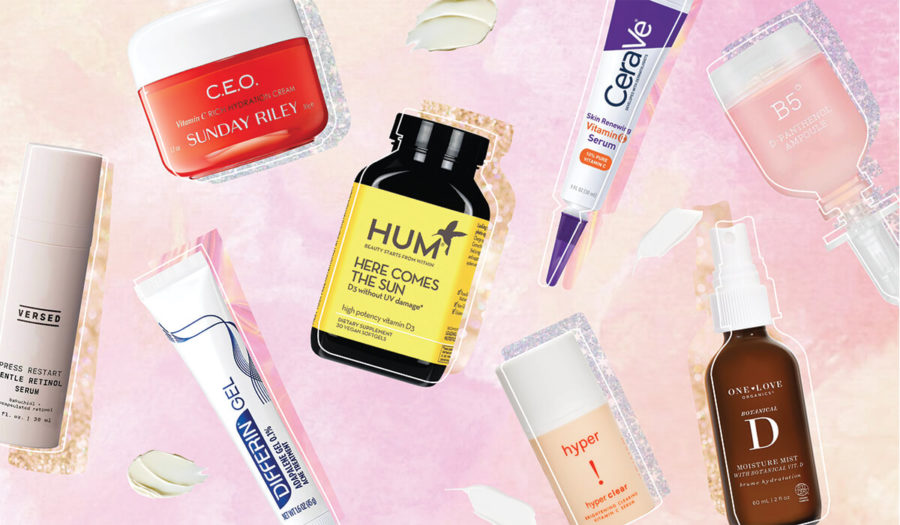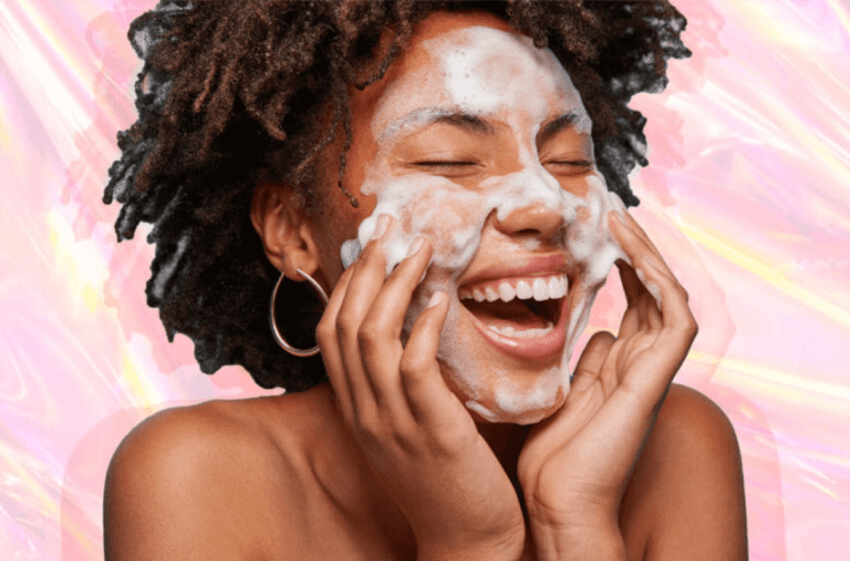Vitamins A, B C, D & E: How Each Type Helps Boost Your Skin

Do you know your skincare vitamin A, B, C, D, and Es? Getting your daily vitamin intake is obvi an important part of your wellness routine. But in addition to helping us feel and look better on the inside, vitamins also play a key role in our skincare regimen. For a closer look at the most popular vitamins in skincare – including A, B, C, D, and E – we asked dermatologists to explain what each does.
Vitamin A
If you were to hold a popularity contest among all the skincare vitamins out there, we’d put our money on vitamin A taking the cake. This dermatologist favorite is where our beloved retinoids, tretinoin, and adapalene come from – as in the stuff that kicks acne to the curb and says sayonara to fine lines, discoloration, and saggy skin.
“Many [people] like topical retinoids for the ingredient’s anti-aging abilities, as it has been shown to stimulate collagen production and reduce fine lines and wrinkles. Topical retinoids also help treat acne breakouts and support the immune functions in the skin,” says Dr. Adam Mamelak, a board-certified dermatologist based in Austin, Texas. “Finally, carotenoids – like beta carotene – are high in antioxidants and can help prevent cell damage, premature skin aging, and other skin diseases.”

Try it: If you’re seeking an over-the-counter retinol, try Olay Regenerist Retinol 24 Facial Moisturizer, $47, or Versed Press Restart Gentle Retinol Serum, $22. If you want one that targets acne specifically, dermatologists say that one of the best is Differin Adapalene Gel 0.1% Acne Treatment, $13.
Find out everything you need to know about retinol and how to add it to your skincare routine here.
Vitamin B
Two different vitamin Bs make a regular appearance in your skincare products: vitamin B3 (niacinamide) and vitamin B5 (pantothenic acid). Both forms are powerful antioxidants that can help bolster the skin’s protective barrier, prevent fine lines from forming, and improve your skin tone and texture.
“Pantothenic Acid, which is vitamin B5, can help revitalize the skin by deeply moisturizing the epidermis and helping heal wounds while addressing free radicals to prevent cell damage,” explains Dr. Gretchen Frieling, a triple board-certified dermapathologist in the Boston area. “Niacinamide is helpful in building the protein that keeps our skin firm while also minimizing the appearance of our pores and regulating oil production.”

Try it: We like The Ordinary’s Niacinamide 10% + Zinc 1%, $5.90, and CosRx Balancium B5 D-Panthenol Ampoule, $24.50. You can even cocktail both together for a skincare double whammy!
Vitamin C
Free radicals (those nasty particles that attack the good stuff in your skin) don’t stand a chance with vitamin C on your side. This supercharged antioxidant superhero is like a shield protecting against those environmental aggressors, ensuring your skin looks healthier and younger for longer. It also helps brighten your skin and evens out your complexion, helping to fade post-inflammatory pigmentation and dark spots.
“Vitamin C is such a mainstay in the beauty industry,” says Dr. Frieling. “This powerful ingredient aids in keeping skin firm and bright while boosting collagen synthesis [and] activating cells called fibroblasts. It also minimizes the appearance of fine lines.”

Try it: You’ll often see vitamin C formulated into serums, boosters, and sometimes creams. We recommend good (skin) days™ C’s The Day Serum, $26, and CeraVe Skin Renewing Face Serum with Vitamin C and Hyaluronic Acid, $25. Because it protects against free radical damage, it’s best to apply vitamin C products in the morning along with your sunscreen. The Hyper Skin Hyper Clear Brightening Clearing Vitamin C Serum, $36, is another vit C-packed product that works alongside vitamin E to brighten skin, smooth fine lines and rough texture, and dramatically clear dark spots from hyperpigmentation.
Posts You'll Love:
Vitamin D
Compared to the other skincare vitamins, vitamin D isn’t used quite as frequently. Dr. Frieling explains that part of the reason why is because it’s still being researched. Preliminary findings, however, point to vitamin D’s ability to “help protect against environmental aggressors and reduce markers of aging,” she says. More research is still required before we can speak about it with as much gusto as we do vitamins A, B, C, and E.

Try it: If you’re curious to see what topical vitamin D can do for your skin, try One Love Organics Vitamin D Moisture Mist, $39. For a more traditional supplement with vitamin D, try Hum Nutrition Here Comes The Sun Vitamin D Supplement, $12.
Vitamin E
Your girl vitamin E has been used in skincare products for decades, and it boasts an array of benefits.
“Vitamin E works as a free-radical scavenger, fighting oxidative stress caused by UV exposure and other sources,” says Dr. Mamelak. “Vitamin E has also been used in wound healing and to help minimize scarring on the skin. As an oil, the antioxidant effect of vitamin E can help to prolong the shelf life of other oil-based products, making it a natural preservative.”
In other words: it nourishes your skin, wards off damage, and helps your products last longer via its preservative qualities. That’s why you’ll often see it paired with vitamin C, which is notoriously tricky to preserve. Basically, this duo is like double trouble for the nasties trying to get your skin down.

Try it: We like Sunday Riley C.E.O. Vitamin C Rich Hydration Cream, $65, and The Inkey List Vitamin B, C, and E Moisturizer, $5.
Disclaimer: Every product we review has been independently selected and tested without bias by our editorial team. We never take payment to review products, however, some brands allow affiliate links, so we may earn a commission if you purchase a product by clicking on one of our links.





















Leave a comment